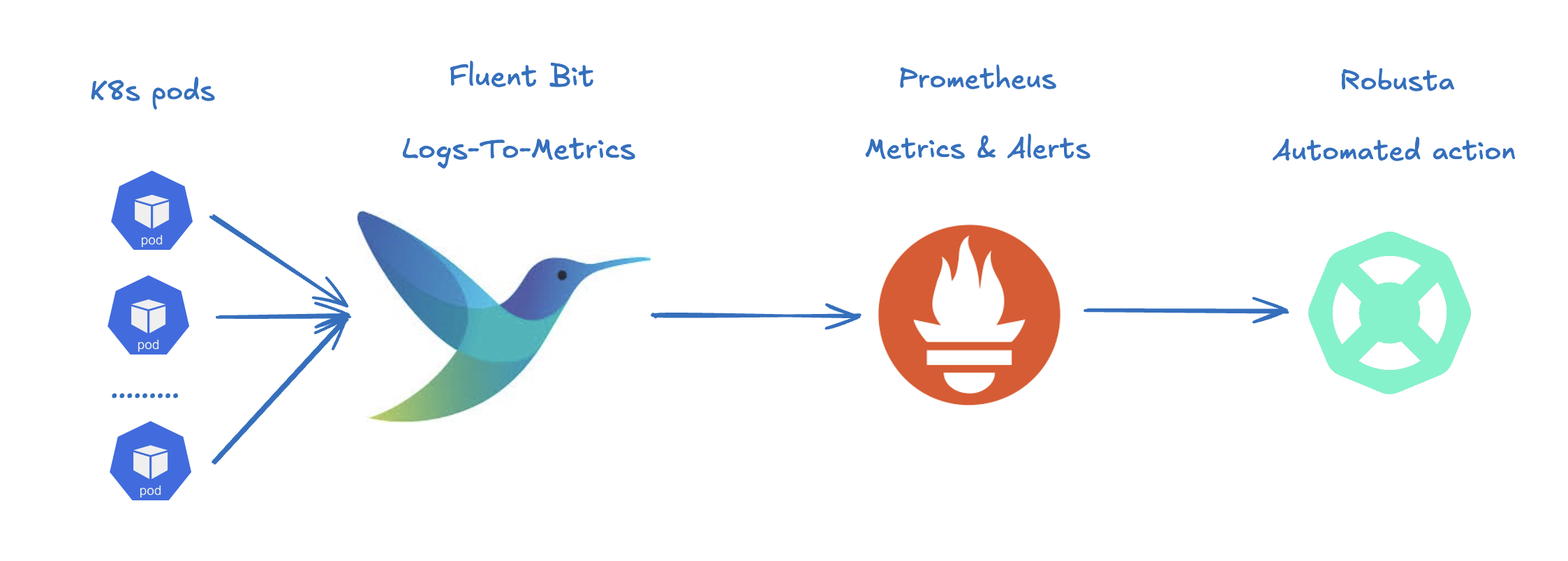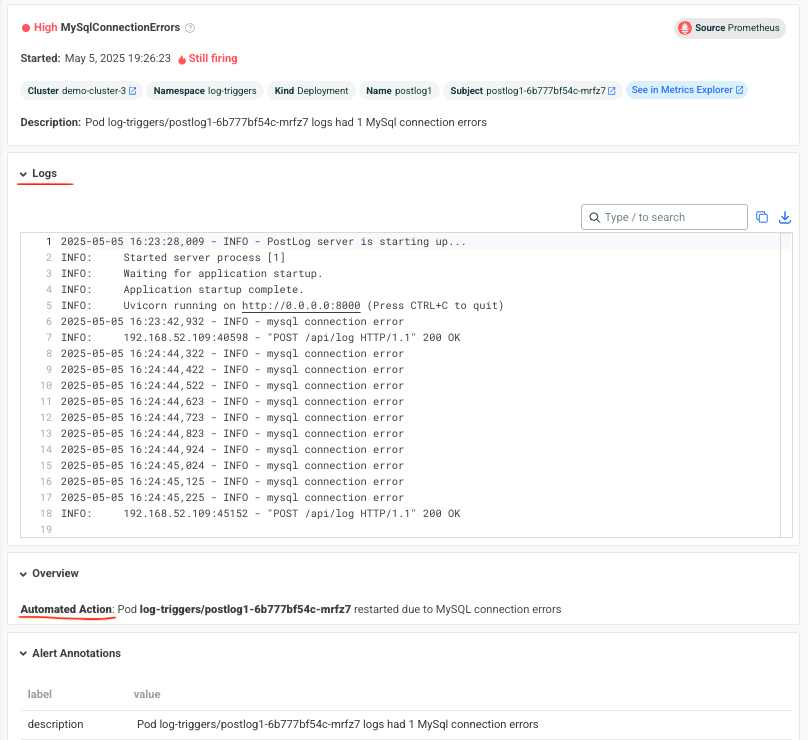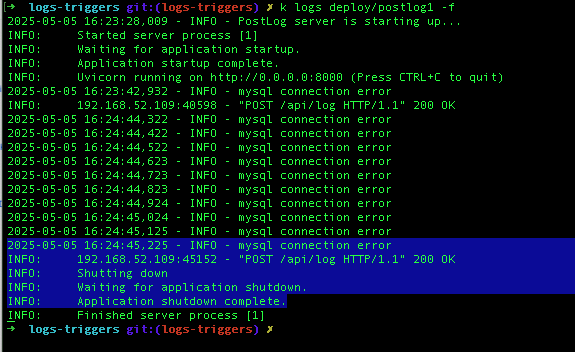Log-based alerting and auto-remediation with fluentbit, prometheus, and robusta¶
This tutorial walks you through building an automation that detects specific patterns in Kubernetes pod logs and responds automatically.
For example, we’ll show how to restart a pod if it logs a database connection error.
To achieve this, we’ll use:
Fluent Bit: Monitors pod logs and converts matching log lines into Prometheus metrics.
Prometheus: Stores the metrics and triggers alerts based on them. (We're going to use Robusta's bundled Prometheus here, but it can work with any other Prometheus distribution)
Robusta: Executes an automated playbook when an alert is fired, such as restarting the affected pod.

Let's get started! Here's a video explainer of how it works:
Step 1: Create a namespace for the demo¶
kubectl create namespace log-triggers
kubectl config set-context --current --namespace log-triggers
Step 2: Parse Logs into Metrics with Fluent Bit¶
First, lets configure Fluent Bit to monitor your pod logs and generate Prometheus metrics for specific log patterns.
We'll configure Fluent Bit as a DaemonSet - there will be a pod on each k8s node
In the example below, we define 2 logs matchers, that create 2 different metrics
We'll use Prometheus exporter, so deliver the metrics to Prometheus
This is our Fluent Bit configuration (fluentbit-values.yaml):
config: service: | [SERVICE] Flush 1 Daemon Off Log_Level info HTTP_Server On HTTP_Listen 0.0.0.0 HTTP_Port 2020 inputs: | [INPUT] Name tail Tag kube.* Path /var/log/containers/*.log Parser json_message DB /var/log/flb_kube.db Mem_Buf_Limit 5MB Skip_Long_Lines On Refresh_Interval 10 [INPUT] Name dummy Tag dummy.alive Dummy {"log":"keepalive"} parsers: | [PARSER] Name wrap_raw_line Format regex Regex ^(?<log>.*)$ filters: | [FILTER] Name kubernetes Match kube.* K8S-Logging.Parser On K8S-Logging.Exclude On [FILTER] name log_to_metrics match * tag log_metrics metric_mode counter metric_name mysql_connection_error metric_description MySql connection errors regex log .*mysql connection error.* add_label pod $kubernetes['pod_name'] add_label namespace $kubernetes['namespace_name'] add_label container $kubernetes['container_name'] [FILTER] name log_to_metrics match * tag log_metrics metric_mode counter metric_name dns_error metric_description DNS Resolution errors regex log .*dns error.* add_label pod $kubernetes['pod_name'] add_label namespace $kubernetes['namespace_name'] add_label container $kubernetes['container_name'] [FILTER] Name log_to_metrics Match dummy.alive Metric_Name fluentbit_keepalive Metric_Description Dummy metric to keep /metrics available Metric_Mode counter Tag log_metrics Regex log .*keepalive.* Flush_Interval_Sec 10 # Process and flush metrics every 60 seconds outputs: | [OUTPUT] Name prometheus_exporter Match log_metrics [OUTPUT] Name stdout Match log_metrics # export metrics metrics: enabled: true extraPorts: - name: metrics targetPort: metrics protocol: TCP port: 2021 containerPort: 2021 serviceMonitor: enabled: true additionalEndpoints: - port: metrics path: /metrics honorLabels: true # important - keep the original label on the metrics (pod, namespace, container)Note
By default, the
log_to_metricsFILTER, adds thelog_metric_counter_prefix to every metricUnderstanding the Configuration
- The
tailINPUT section defines all Kubernetes container logs as input- The
dummyINPUT section defines a keepalive input - it's required to create at least 1 active metric- The
kubernetesFILTER section is for adding the Kubernetes labels to the log lines/li>- The 1st
log-to-metricsFILTER - match any log line containing "mysql connection error", and increase the ``mysql_connection_error`` counter. Add the pod labels to the metric- The 2nd
log-to-metricsFILTER - match any log line containing "dns error", and increase the ``dns_error`` counter. Add the pod labels to the metric- The 3rd
log-to-metricsFILTER - for the keepalive metric- The
prometheus_exporterOUTPUT is for exporting the Prometheus metrics- The
stdoutOUTPUT is used for debugging. It prints the metrics to the fluentbit pod logs. Not required for production deployment
Let's deploy the Fluent Bit DaemonSet:
helm repo add fluent https://fluent.github.io/helm-charts && helm repo update helm install metrics-fluent-bit fluent/fluent-bit -f ./fluentbit-values.yaml
Step 3: Configure Prometheus¶
In this step, we will configure Prometheus to:
Collect metrics from Fluent Bit via a ServiceMonitor
Configure an alert based on the metrics extracted from the logs
1. Configure Prometheus to read the new ServiceMonitor¶
Assuming you're using Robusta's bundled Prometheus, add this to your generated_values.yaml:
kube-prometheus-stack: prometheus: prometheusSpec: serviceMonitorSelectorNilUsesHelmValues: false
This ensures that Prometheus will read all the service monitors defined in the cluster, not just those installed by the same Helm release (which is the default behavior).
To apply it, upgrade with helm:
helm upgrade robusta robusta/robusta -f generated_values.yaml -set clusterName=YOUR_CLUSTER
2. Configure an Alert¶
This is the alerting rule that will be used to trigger an alert when a MySqlConnectionErrors is detected in the logs (mysql-alert.yaml):
apiVersion: monitoring.coreos.com/v1 kind: PrometheusRule metadata: labels: release: robusta name: log-alerting-rule namespace: log-triggers spec: groups: - name: log-alerting rules: - alert: MySqlConnectionErrors annotations: description: 'Pod {{$labels.namespace}}/{{$labels.pod}} logs had {{ printf "%.0f" $value }} MySql connection errors' summary: Increase in MySql connection errors in the pod logs expr: increase(log_metric_counter_mysql_connection_error[5m]) > 1 for: 1m labels: severity: criticalNote
This alert will fire starting from the 2nd time the log line appears - catching the first time is not possible due to how fluentbit works (it only creates the metric after the log appears at least once)
The label
release: robustais required for Robusta's Prometheus to read this alerting rule. Make sure the release name matches the name of your Robusta release
To apply it run:
kubectl apply -f mysql-alert.yaml
Step 4: Adding a Robusta playbook¶
Now, we'd like to configure an automated action that will run each time this alert is fired.
For that, we'll use a Robusta playbook
This is the playbooks we're going to use (add it as a customPlaybooks section in your generated_values.yaml file):
customPlaybooks: - triggers: - on_prometheus_alert: alert_name: MySqlConnectionErrors # Run when ever the MySqlConnectionErrors alert starts firing actions: - logs_enricher: {} # Add the pod logs to the alert notification - delete_pod: {} # Delete (restart) the pod the alert was fired on - template_enricher: # Add a note to the alert notification, that the pod was restarted template: "**Automated Action**: Pod **${namespace}/${name}** restarted due to MySQL connection errors"
To apply it, upgrade with helm:
helm upgrade robusta robusta/robusta -f generated_values.yaml -set clusterName=YOUR_CLUSTER
Step 5: See It in Action¶
Let’s test the full automation pipeline by generating a log line that simulates a MySQL connection error.
1. Deploy a demo pod¶
Use this manifest to deploy a demo pod that prints to the logs whatever is sent to its API (postlog.yaml):
apiVersion: apps/v1
kind: Deployment
metadata:
name: postlog1
namespace: log-triggers
spec:
replicas: 1
selector:
matchLabels:
app: postlog1
template:
metadata:
labels:
app: postlog1
spec:
containers:
- name: postlog1
image: me-west1-docker.pkg.dev/robusta-development/development/postlog:2.0
ports:
- containerPort: 8000
resources:
requests:
memory: "128Mi"
cpu: "50m"
limits:
memory: "256Mi"
---
apiVersion: v1
kind: Service
metadata:
name: postlog1
namespace: log-triggers
spec:
selector:
app: postlog1
ports:
- port: 80
targetPort: 8000
type: ClusterIP
Apply it to your cluster:
kubectl apply -f postlog.yaml
2. Generate MySQL errors in the logs¶
Call the pod’s API to print some simulated MySQL errors.
Since the metric has no initial value, we'll call it twice, to simulate an increase. First time with 1 log line:
kubectl run curl --rm -it --image=curlimages/curl --restart=Never -- \ curl -X POST http://postlog1.log-triggers.svc.cluster.local/api/log \ -H "Content-Type: application/json" \ -d '{"content": "mysql connection error", "count": 1}'
Then, after 60 seconds, with 10 log lines:
kubectl run curl --rm -it --image=curlimages/curl --restart=Never -- \ curl -X POST http://postlog1.log-triggers.svc.cluster.local/api/log \ -H "Content-Type: application/json" \ -d '{"content": "mysql connection error", "count": 10}'
This will produce 10 log lines containing the error. Fluent Bit will match the log lines and emit metrics, which Prometheus will collect.
3. Trigger the alert and observe the automation¶
Wait a few minutes (typically up to 5) for the alert to fire. This delay is due to the for condition in the alert and Prometheus' group_interval.
Once the alert fires, you’ll see the MySqlConnectionErrors alert in:
The Robusta UI (if installed)
Slack, Microsoft Teams, or your configured destination

You should also see that the postlog1 pod was restarted:

Note
This example used a restart pod automation, but you can replace it with any other action in Robusta – such as creating a Jira ticket, scaling a deployment, or notifying a human.
🎉 That’s it! You've now built a full pipeline that watches logs, turns them into alerts, and takes automated action.